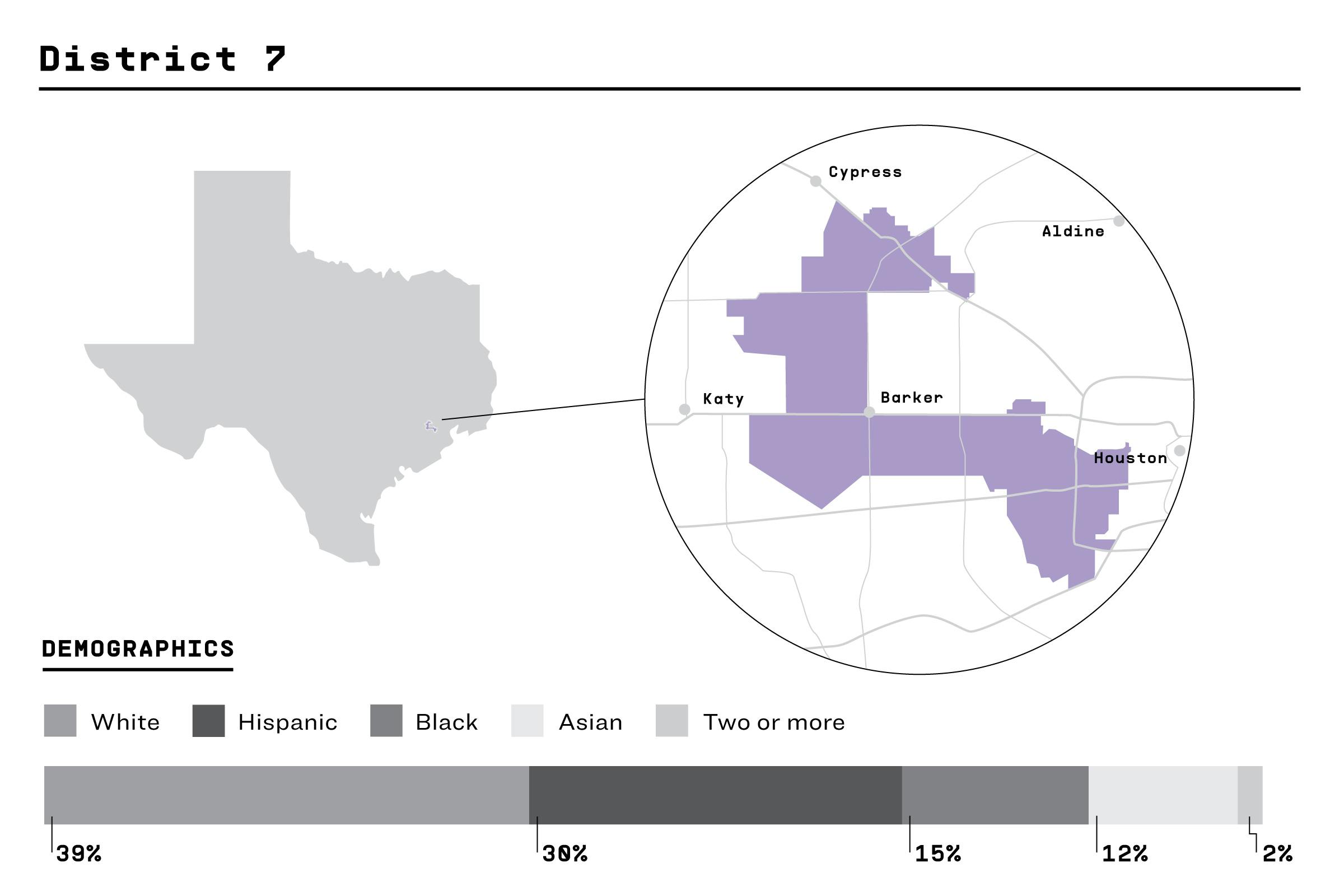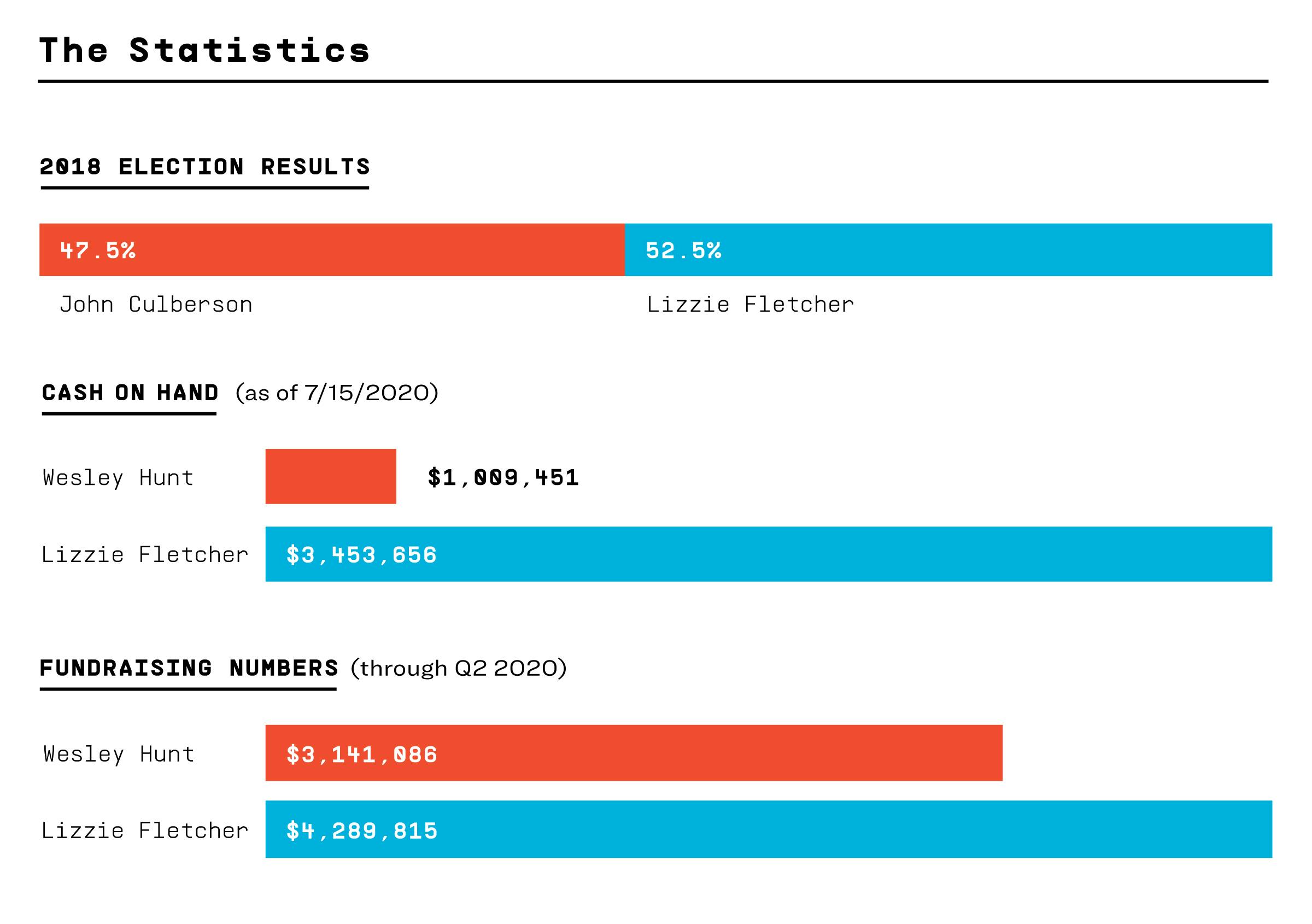For years, the tantalizing prospect of Texas becoming a “purple” battleground state has motivated Democrats—who have had their hopes dashed in election after election. However, the 2018 midterms showed cracks in the GOP’s hold on the state, with Democrats picking up congressional seats in districts that were drawn by Republican mapmakers to be easy holds. Now polling suggests that 2020 could see further gains by Democrats.
While all eyes are on the presidential campaign, and, er, some eyes are on the surprisingly low-profile Senate race between GOP incumbent John Cornyn and Democratic challenger MJ Hegar, the fiercest battles in Texas are over seats in the U.S. House of Representatives. Four years ago, the state had just one competitive congressional race; this year, there are a dozen races both parties are acting as if they’ve got a real shot at winning.
Today, we’re continuing our “Get to Know a Swing District” series with a look at Texas’s Seventh Congressional District.
The District
History
Texas’s Seventh was initially drawn after the 1880 Census, and—like much of the state—spent nearly a century as a Democratic stronghold. When it was redrawn in the mid-1960s to include the west side of Houston, though, the seat was won by a World War II naval aviator and rising GOP star named George Herbert Walker Bush. Bush held the seat for two terms before launching a failed bid for the U.S. Senate. Republicans held on to the seat for the next five decades, until Democrat Lizzie Fletcher’s upset win over nine-term congressman John Culberson in 2018.
For Texas Democrats, Fletcher’s success (and that of fellow Democrat Colin Allred, in the Dallas suburbs) proved that the party could win more than moral victories. The Texas GOP fears the loss in TX-7 was a harbinger of what’s to come for the party. That makes the Seventh a battleground that both Democrats and Republicans are pouring money into.
What It’s Shaped Like
Kind of like the drainpipe you’d find under your sink. The district starts on the west side of Houston’s Inner Loop, covering the upscale neighborhoods of West University Place, Bellaire, and River Oaks. It makes a sharp westward turn for a thin stretch bounded by Interstate 10 and Westheimer Road, and then makes another sharp turn at George Bush Park. The district then stretches north to swallow up parts of the affluent communities of Cypress and Jersey Village, before spilling east again to grab some additional voters on the other side of U.S. 290.
The Candidates
Meet Lizzie Fletcher
A native Houstonian, Fletcher returned to her hometown after graduating from William & Mary Law School in 2006, and handled business litigation for more than a decade. After Donald Trump’s win in 2016, Fletcher was drawn to politics—like many Texas Democrats who ran their first races in 2018. Unlike most of them, however, she won—and by nearly five points.
Fletcher’s campaign touts her moderate record. While other Democrats running for office in Texas have pushed for replacing the insurance industry with a single-payer system, she supports strengthening the Affordable Care Act and adding a public option; on climate change, she favors the U.S. rejoining the Paris Agreement, but penned an op-ed in the Houston Chronicle opposing the Green New Deal.
The first piece of legislation Fletcher introduced in 2019, a bill to speed along the process of dispersing federal disaster relief funds, passed with bipartisan, nearly unanimous support. Later that year, she voted in favor of Donald Trump’s impeachment. That might have been a difficult decision at the time—the Chronicle reported in January that Republicans looking to take back the seat planned to focus on her impeachment vote—but as GOP candidates have distanced themselves from Trump in recent months, the issue has rarely come up. (Instead, Republican attacks have tried to paint the pro-fracking Democrat as a fervent environmentalist.)
Fletcher was a fund-raising juggernaut in the first half of the year. She raised nearly $4.4 million through the second quarter of 2020 and had more than $3.4 million in the bank by the end of June. In her just-released Q3 totals, she raised an additional $1.3 million—a figure that would be even more impressive if she hadn’t been outraised by a greater than two-to-one margin by the challenger.
Meet Wesley Hunt
Like Fletcher, Hunt, a West Point grad and combat vet, is also a native Houstonian. Following his time in the Army, Hunt returned to Houston and began a career in real estate. He entered a crowded Republican primary field in April of last year, received Donald Trump’s endorsement, and vowed “to continue to serve to stop domestic threats like the Green New Deal, socialist health care, and illegal immigration.” This March, he cruised to the GOP nomination with 61 percent of the vote.
Hunt’s campaign has continued to center his opposition to the Green New Deal, a hot-button issue in energy-reliant Houston. He calls for a full repeal of the Affordable Care Act, though his campaign says that he believes in protecting coverage for Americans with pre-existing conditions (but doesn’t spell out how he would accomplish that). Hunt opposes “amnesty” for undocumented immigrants, while supporting a border wall. He opposes abortion except in the case of rape or, incest, or when continuing the pregnancy would be life-threatening.
One of the “Young Gun” candidates the National Republican Congressional Committee recruited this cycle, Hunt could be the only Black member of the GOP serving in the House if he wins (depending on how a few other races play out). His Q2 fund-raising totals were a fraction of Fletcher’s, but his recently announced numbers through the end of September are more competitive: he’s raised nearly $3.2 million, with a staggering $2.8 million of it raised in the third quarter alone, and had more than a million of it on hand through Q3.
The Upshot
Why It Could Flip
Texas’s Seventh Congressional District was a GOP stronghold for decades, held by three popular representatives between 1967 and 2019. While more Democrats have moved into the district in recent years, it remains closely divided in terms of party preference, and Hunt is well positioned to keep it competitive. There’s not much in the way of polling in the district, but the GOP released an internal survey in March that found the two candidates running neck and neck.
Why It Probably Won’t
Fletcher’s success probably wasn’t a midterm fluke. The district has been trending more Democratic for a decade: Mitt Romney won the Seventh by 21 points in 2012, Hillary Clinton won it by a little more than a point in 2016, and Beto O’Rourke took it by 7 points in 2018. Fletcher might benefit this year from the unpopular Trump being on the ticket. The GOP seems aware of this, as the NRCC announced in September that it was canceling a $2 million ad buy in Houston that was expected to help Hunt.
Experts at Politico identify the race as “lean Democratic.” The Cook Political Report’s analysis nudges it even further in Fletcher’s favor with a “likely Democratic” rating, meaning it’s not considered competitive at the moment but could become so. But with Election Day drawing ever closer, the opportunities for that to happen are dwindling.
The Bottom Line
TX-7 is most likely a district that both parties will have a real shot at winning for the foreseeable future (although with another post-census redistricting on the horizon, and control of the map-influencing powers in the Texas House up for grabs, things could change rapidly). Hunt may well have a bright future in the GOP, but it’ll take something unusual for him to take a big step up this year.
Correction: A previous version of the map identified Lubbock as just outside of the district. Even Texas doesn’t have a district big enough to nearly connect Houston and Lubbock.
- More About:
- Politics & Policy










